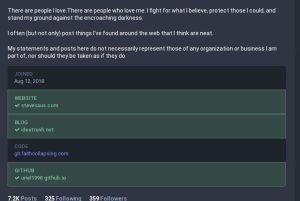There are two things you need to do and remember as social media transforms itself.
- There is no central authority verifying any identity on the internet.
- You are responsible for doing the due diligence to make sure that account you’re talking to really is whom they claim to be.
That means is that if you find a social media account for a brand, a person, an organization, you cannot assume that they are for sure who they claim to be.
We got spoiled with the birdsite and zuckbook doing (at least some) of that for us. And there’s a number of pundits wringing their hands about verification.
But that’s the wrong way to think about it, particularly for a federated social network.
Think of it the way you think of email.
If you get an email from, say, co******@gm***.com or pe***@ou*****.com, it would be trés sus.
At least you’d go and look at the company’s website and see if the email listed there matches where you got the email from.
And anybody could set up an email address with a similar name to yours. I had it happen — and had to argue with a healthcare billing agency — because there are two or three other people in the country who share a name with me.
Again, this is no big deal. We’ve dealt with it for decades with email without too many problems.
And some people do not want to have some or all of their social media accounts to be linked back to their real life. This doesn’t apply to them.
But when you’re a public figure — even the smallest of small fry — you may want to basically ensure that people can know that you are you.
The simplest way to do that is by using the rel=me functionality of Mastodon, or (if the social media network you’re on does not have that implemented) making sure that you have links from your official site to your social media accounts and back again.
So for example, you can look at the blog here and see a link to my Mastodon account. You can also look at my nameplate website page and also see a link to the same account. And you can see links back to both from the Mastodon account’s profile.
For a slightly more official version, you can include a rel=me link on those other sites back to your Mastodon profile as well. Then your Mastodon profile will actively show that the person who owns that site has put a specially formatted link on that website back to the Mastodon profile (highlighted in green below).
So you can see here that I’ve done that with my website, blog, and github page (I haven’t done it yet with gitea).
Sure, this does not necessarily mean that the person behind this account is actually me — just that the same person/entity controls those sites. But especially with established websites and blogs — particularly if they have a domain already linked to your identity — then that goes a long way.
Which brings me to the other big point here:
Also, if you do not already own the domain of your name and you can, then SNAP THAT UP NOW and set up a (mostly) free nameplate page.
You can still use about.me, or use a simple HTML template and roll your own (which honestly is better if you can swing it).
Does all this mean that you have to do a bit more due diligence? That you have to stop and consider if that corporate account that got snarky at you is actually the corporation or a fake? That you have to think critically about what you’re reading on the internet?
Yes, it absolutely does.
But in our world of half-considered "hot takes" and knee-jerk reactions, that is not a bug. That is a feature.

